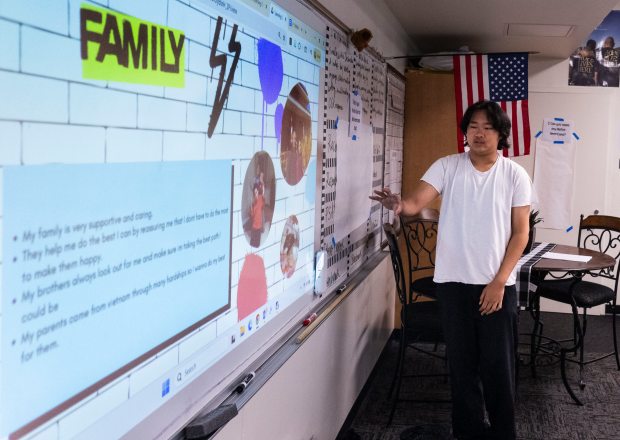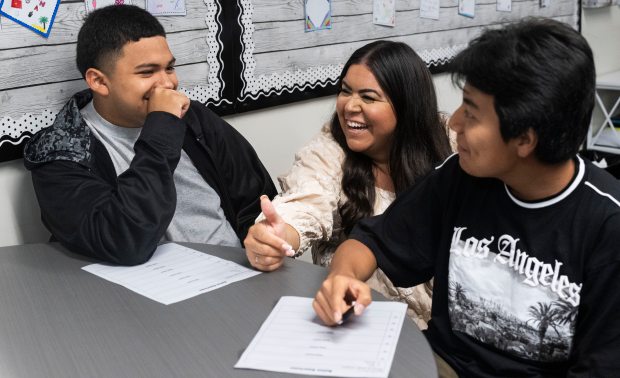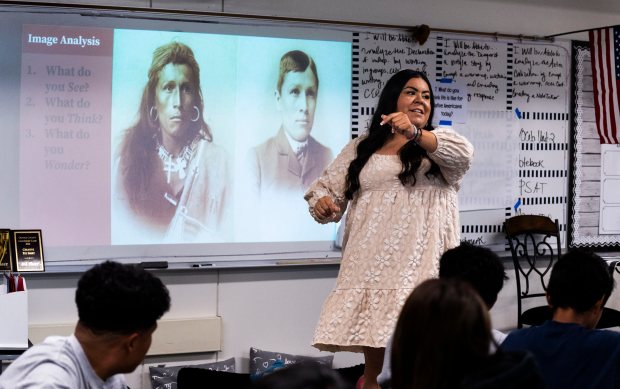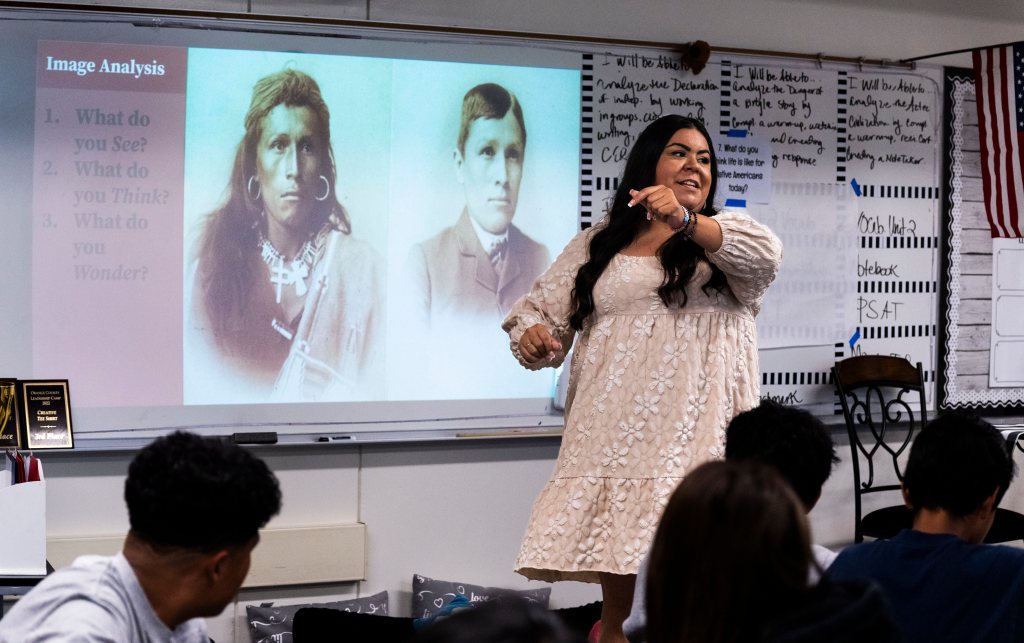California’s plan to roll out ethnic studies at every high school this fall hit a snag when lawmakers left implementation money out of the state budget — but districts across Orange County are largely pushing ahead on their own.
State law says high school students need to complete an ethnic studies course to graduate, starting with the class of 2030. All public schools, including charters, are required to offer at least one semester of ethnic studies beginning in the 2025-26 school year. Both requirements rely on state funding, but the latest budget provides none.
The state provided one-time grants in fiscal year 2021-22 for developing courses and training teachers, but district officials say that money isn’t enough to sustain programs long term, especially those requiring dedicated teachers. In Orange County, grants totaling just over $4 million were distributed among the county education office, school districts and several charter schools.
“There isn’t ongoing state funding dedicated to ethnic studies, so districts will need to use other resources to sustain their programs moving forward,” said Ian Hanigan, Orange County Department of Education spokesperson.
Teacher Trisha Camargo talks to her Ethnic Studies class at Bolsa Grande High School in Garden Grove, CA on Thursday, Oct. 9, 2025. (Photo by Paul Bersebach, Orange County Register/SCNG)

Student Kien Nguyenluu gives a presentation during Ethnic Studies class at Bolsa Grande High School in Garden Grove, CA on Thursday, Oct. 9, 2025. Nguyenluu (Photo by Paul Bersebach, Orange County Register/SCNG)

Students participate in a communication exercise in their Ethnic Studies class at Bolsa Grande High School in Garden Grove, CA on Thursday, Oct. 9, 2025. Students were sharing their answers to questions from a Native American gallery walk in the classroom. (Photo by Paul Bersebach, Orange County Register/SCNG)

Nhat Anh Ma participates in a communication exercise in her Ethnic Studies class at Bolsa Grande High School in Garden Grove, CA on Thursday, Oct. 9, 2025. Students were sharing their answers to questions from a Native American gallery walk in the classroom. (Photo by Paul Bersebach, Orange County Register/SCNG)

Teacher Trisha Camargo talks with Marco Jiminez, left, and Gustavo Hernandez-Martinez during Ethnic Studies class at Bolsa Grande High School in Garden Grove, CA on Thursday, Oct. 9, 2025. (Photo by Paul Bersebach, Orange County Register/SCNG)

Students post their answers during a Native American gallery walk in Ethnic Studies class at Bolsa Grande High School in Garden Grove, CA on Thursday, Oct. 9, 2025. (Photo by Paul Bersebach, Orange County Register/SCNG)

Teacher Trisha Camargo talks to her Ethnic Studies class at Bolsa Grande High School in Garden Grove, CA on Thursday, Oct. 9, 2025. (Photo by Paul Bersebach, Orange County Register/SCNG)
Show Caption
1 of 7
Teacher Trisha Camargo talks to her Ethnic Studies class at Bolsa Grande High School in Garden Grove, CA on Thursday, Oct. 9, 2025. (Photo by Paul Bersebach, Orange County Register/SCNG)
Locally, implementation has varied.
Brea-Olinda Unified plans to pilot a standalone semester-long ethnic studies elective this spring, while students can also take a Chicano studies course through Fullerton College, spokesperson Melissa Serrato said. Newport-Mesa Unified piloted an opt-in ethnic studies elective last school year. Neither district currently requires these courses for graduation.
The Irvine and Orange school districts are piloting ethnic studies courses this year, with plans to expand them to all their high schools in 2026-27.
In Irvine Unified, the semester-long course is offered to juniors and seniors. Spokesperson Annie Brown said course development was guided by “a multi-stakeholder committee, including teachers, administrators, counselors, students, parents and district staff,” which met over two years. One-time state funds totaling $285,219 have been used for curriculum development and teacher training, Brown said.
Orange Unified students can take a virtual ethnic studies elective. Spokesperson Hana Brake said the district is creating a one-semester course to pilot in the spring and fully implement in fall 2026-27. Brake said the district plans to revise graduation requirements to include ethnic studies starting with the class of 2030.
Orange County has become a statewide leader in shaping how ethnic studies will be taught. After new state laws opened the door for expanded cultural curriculum, the county’s education department was tapped by the California Department of Education to design Cambodian, Hmong and Vietnamese model curricula.
Developed as standalone programs separate from the state’s broader ethnic studies curriculum, some lessons can be used to meet the graduation requirement, according to the county education department.
That work is already being shared across California. In September, more than 400 educators and community members gathered in Garden Grove for a two-day conference focused on helping educators bring the Vietnamese American model curriculum into classrooms. Additional conferences focused on Cambodian and Hmong American studies are planned later this school year.
Marika Manos, manager of history and social science for the county education department, said Santa Ana and Anaheim Union were early adopters of ethnic studies requirements.
Santa Ana offers multiple ethnic studies options: as a standalone elective, paired with a required class and even a course through Santa Ana College. The district lists ethnic studies as a graduation requirement.
SAUSD expects to spend about $50,000 to $60,000 this year on courses, including materials, spokesperson Fermin Leal said.
The rollout faced legal challenges when two Jewish civil rights groups sued, alleging antisemitic content. The district eventually settled and revised the curriculum.
Anaheim Union also requires ethnic studies for graduation, starting with the class of 2026. The district rolled out its first ethnic studies elective in 2015 and in 2023, the district introduced the first-of-its-kind high school course focused on Korean-American history, with curriculum development sponsored by the Korean Consulate General in Los Angeles.
In Laguna Beach Unified, all students must take a semester-long multicultural studies course paired with a semester-long health class, according to spokesperson Stephanie Romero. The state provided nearly $26,000 to launch the course, Romero said, and “it’s now fully integrated into our programming, so ongoing costs are minimal.”
Garden Grove Unified will require ethnic studies for the graduating class of 2028, two years earlier than the state mandate, according to district spokesperson Abby Broyles.
Currently, high school students can take a course on Vietnamese-American history, and a Mexican-American history class is pending. Broyles said the district launched these courses using one-time state funding, totaling $344,942.
“Each school site received funding to hire a social studies/history teacher and funding was allocated for new pacing guidelines developed through our established teacher consult process, trainings were created and all teachers assigned to the course participated in the training,” Broyles said.
That front-loaded funding helped many Orange County districts move quickly, Manos said, and strong teacher support combined with community interest helped the rollout outpace much of the state.
But that comes with a financial caveat, Manos said, which is ongoing funding for implementation isn’t available. Many districts opted to offer ethnic studies as standalone electives rather than fold it into existing classes such as English or history, which wouldn’t have required hiring additional teachers.
“I’m not sure how long our ‘being ahead of the curve’ is going to stay, because it does cost a lot of money to have a new teacher teaching an elective course,” Manos said. “I think that the districts that chose to integrate it into another course are going to have an easier time keeping it as a course. What that means is that a kid could take ninth-grade English and meet their ethnic studies requirement. So it’s not like they’re going to have to pay for an extra teacher.”
Placentia-Yorba Linda Unified offers a yearlong ethnic studies elective at all four of its high schools. District spokesperson Lorely Meza said the multicultural studies course will become a graduation requirement starting with the class of 2030.
The standalone elective course is currently funded through the one-time state grant, which provided nearly $209,000 for the district, Meza said.
Capistrano Unified, the largest district in Orange County, does not yet offer an ethnic studies course. According to the district’s website, updated in August, it “will continue preparatory work so we can implement a high-quality course once the state appropriates funds.”
Earlier this year, the district held a community webinar and a workshop and discussed the ethnic studies requirement at a January board meeting. A document outlining potential lessons is posted on its website for public review.
When asked whether the state plans to provide funding beyond the one-time grants, H.D. Palmer, a spokesperson for the Department of Finance, said the law will only take effect once the legislature appropriates funds in the annual budget or another law. So without funding, it really isn’t a mandate yet.
“Given current revenue projections, where legislation wasn’t funded in prior budgets and remains contingent upon a future appropriation (as is the case with AB 101 and other bills), the administration hasn’t proposed funding,” he said in a statement.
Manos said she expects district leaders will keep pushing to make the classes available, and not just because of the state mandate.
“My sense is that a lot of schools will continue ethnic studies because of kids’ interest,” Manos said. “If kids want to take the course, they’re going to let the kids take the course.”
Originally Published: October 10, 2025 at 10:39 AM PDT

